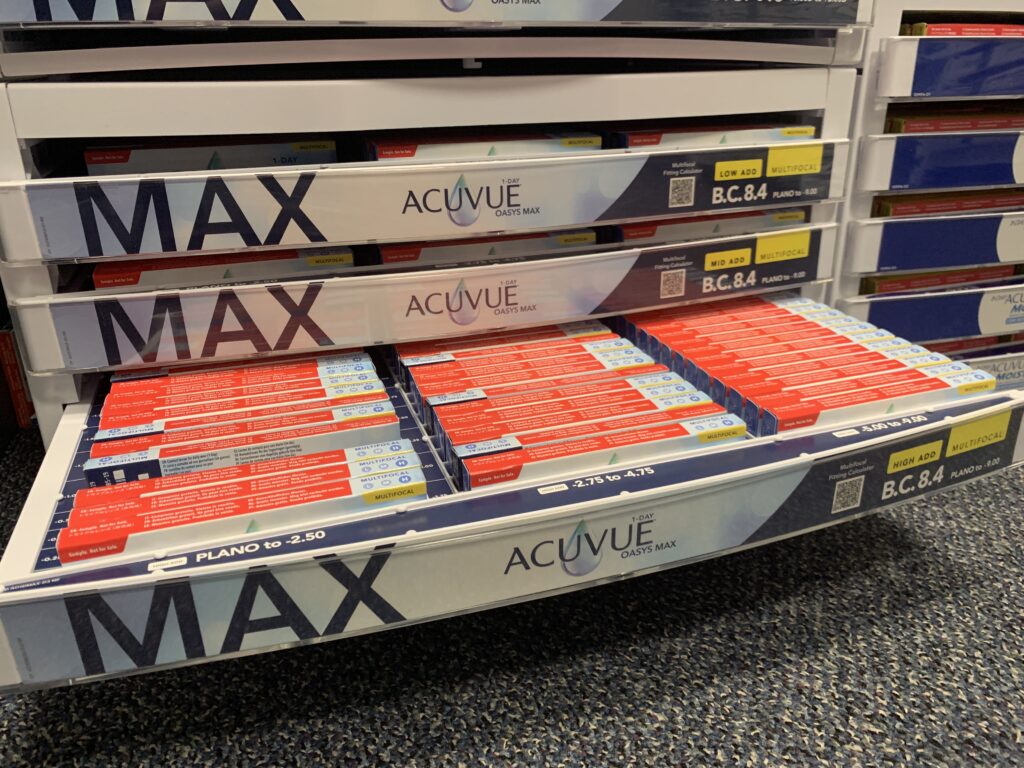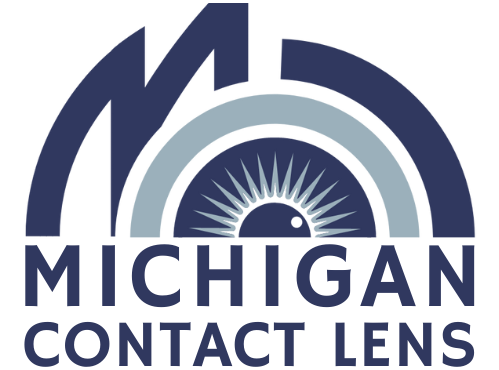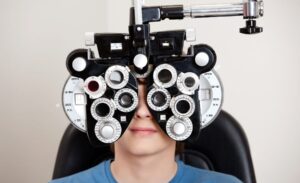Schedule a Multifocal Contact Lens Exam Today
Multifocal contact lenses aren’t easy to fit! Get the right contact lens prescription the first time with our contact lens specialist. Every patient gets an immersive exam including a topography and more free trials than you can handle!
The Benefits of Multifocal Contact Lenses
Presbyopia is a natural part of aging that causes difficulty in focusing on objects up close. If you’re currently struggling with blurry text on your phone or squinting while reading a book, then multifocal contact lenses may be the answer you’ve been looking for. These special lenses are designed to give you clear vision at all distances, so you can see comfortably without the need for reading glasses. In this blog post, we’ll explore the benefits of multifocal contact lenses for those with presbyopia and give you some tips on how to choose the right ones for your needs. So, let’s get started and see how these lenses can make a world of difference in your day-to-day life!
Contact lenses instead of bifocals or progressive glasses
As Michigan contact lens specialists, we’ve seen many patients come in with complaints of difficulty reading up close. This is often due to the natural aging process, known as presbyopia. What happens is that the eye’s lens begins to lose its ability to focus on nearby objects, leading to blurred vision and eye strain. Fortunately, there are contact lenses specifically designed to help with this condition. At our practice, we offer a range of options for presbyopia, including multifocal lenses that can provide clear vision at various distances. If you’re experiencing symptoms of presbyopia, don’t hesitate to schedule an appointment with us to discuss your options for contact lenses that can improve your quality of life.
As a Contact Lens Specialist, we often encounter patients who are experiencing presbyopia. This condition is characterized by a gradual loss of the ability to focus on objects up close, and it tends to affect people as they age. The most common symptom of presbyopia is difficulty reading small print and focusing on things up close. This can be frustrating for patients who rely on their eyesight for work, hobbies, or everyday activities like reading a book or using a computer. Fortunately, there are a variety of contact lens options available that can help address the symptoms of presbyopia and improve visual acuity. At our practice, we work closely with patients to determine the best type of lenses to meet their individual needs and preferences. Whether you prefer soft lenses, gas permeable lenses, or multifocal lenses, we have options that can help you see clearly and comfortably. So if you’re struggling with presbyopia, don’t hesitate to schedule an appointment with our team to discuss your options and find a solution that works for you.
Furthermore, Michigan Contact Lens specialists are highly trained professionals who can provide you with the best possible solutions to your vision problems. They have access to the latest technologies and products that can help improve your visual experience and reduce the impact of presbyopia. Whether you need daily contact lenses, multifocal lenses or custom-made lenses, a contact lens specialist can work with you to find the perfect fit. By partnering with a Michigan Contact Lens specialist, you can feel confident that you are receiving the best possible care for your eyes and that your visual needs will be met with precision and accuracy. So why wait? Schedule your appointment today and start experiencing the benefits of custom-fitted contact lenses!

The Benefits of Multifocal Contact Lenses
If you are considering contact lenses, you may want to consult with a contact lens specialist, particularly if you are over 40 and experiencing difficulty seeing things up close. One option your specialist may recommend is multifocal lenses. These lenses provide the convenience of correcting both distance and near vision with a single pair of contacts. They work by having different prescriptions in different areas of the lens. This means you can see far away objects clearly while also being able to read up close without having to switch between different pairs of glasses or contacts. While they may take some getting used to, multifocal lenses are an excellent option for those who want the convenience of only needing one pair of contacts for all their visual needs. Your contact lens specialist can help you determine if they are the right choice for you.
Also, it is important to seek guidance from a contact lens specialist when considering multifocal contacts. A specialist can help you determine the best type of multifocal lenses for your specific needs and lifestyle. They can also provide valuable information on how to properly care for your lenses and offer tips on how to adjust to wearing them. With their expertise, you can rest assured that you are making a sound investment in your eye health and vision. So, if you are tired of juggling multiple pairs of glasses or struggling with reading small print, consider scheduling an appointment with a contact lens specialist to explore the benefits of multifocal contacts.
How Multifocal Contact Lenses Work
As a contact lens specialist, I often recommend multifocal contact lenses for my patients who struggle with both near and far vision. These lenses are specifically designed to correct vision at all distances, providing clear and crisp vision for wearers. With multifocal lenses, you won’t need to switch between glasses or contacts for different tasks throughout the day. Instead, you can enjoy seamless transitions from reading a book up close to driving down the highway. So if you want to say goodbye to the frustration of constantly switching between glasses or contacts, come see me, your trusted contact lens specialist, and let’s talk about the benefits of multi-focal lenses.
Moreover, the advancements in contact lens technology have allowed specialists to create lenses that cater to various visual needs. Contact lenses with multifocal lenses are designed to help people with presbyopia, a common vision problem that affects individuals over the age of 40. The design of these lenses, which differs from traditional single-vision lenses, offers two separate lens powers built into one, a distance power for faraway objects and a near power for nearby objects. This allows wearers to easily transition between different viewing distances. The contact lens specialists are well-versed in fitting these lenses and provide guidance to patients on how to adapt to the new lens design. With the help of contact lens specialists, patients are able to experience sharp and clear vision without the hindrance of glasses.
Seeking Professional Advice from a Contact Lens Specialist
When it comes to wearing contact lenses, it’s important to seek advice from a professional contact lens specialist. They can guide you on the best types of lenses that are suited to your specific vision needs and lifestyle. A specialist can also provide you with valuable tips on how to properly use and take care of your lenses, so that you can enjoy the best possible vision. One example of a specialty lens that a contact lens specialist may recommend are multifocal lenses, which are designed to address the vision needs of individuals with presbyopia. With the help of a contact lens specialist, you can ensure that your lenses are comfortable, effective, and suited to your unique vision requirements. Other services are Myopia Management and Control.
Thereafter, regular visits to a contact lens specialist are an essential part of maintaining healthy eyes and clear vision. The technology behind contact lenses is always advancing, and it’s important to stay up-to-date on the latest developments in eye care. By visiting a specialist at least once a year, you can rest assured that your lenses are providing you with the best possible protection and vision quality. Additionally, your specialist will be able to identify any potential issues early on and provide you with the necessary treatments or adjustments, ensuring that you enjoy comfortable and hassle-free contact lens wear. Don’t neglect your eye health – schedule a visit with a contact lens specialist today.

Multifocal contact lens exam frequently asked questions
During a multifocal contact lens exam, the optometrist will assess your vision needs at various distances. They will also evaluate your eye health and perform a comprehensive eye exam. Additionally, they will determine the specific prescription and type of multifocal contact lenses that will suit your individual needs.
Multifocal contact lenses are generally recommended for individuals over the age of 40 who have presbyopia. Presbyopia is an age-related condition that causes difficulty focusing on close objects. However, the suitability of multifocal contact lenses depends on various factors, including the patient’s eye health, lifestyle, and visual demands.
No, there are different types of multifocal contact lenses available. Some lenses provide simultaneous vision for both near and distance vision, while others offer segmented vision, where one part of the lens focuses on near objects and the other on distant objects. The optometrist will determine the most suitable type of multifocal contact lenses based on your specific vision needs.
Yes, it may take some time for your eyes to adjust to multifocal contact lenses. Some individuals may experience initial discomfort or difficulty adapting to the lens design. However, most people find that their eyes adapt within a few days to a couple of weeks. Your optometrist can provide tips for a smooth transition and monitor your progress during follow-up visits.
Multifocal contact lenses typically cost more than regular contact lenses due to their advanced design and specialized features. The price may also vary depending on the brand, material, and prescription strength. However, the long-term convenience and reduced need for multiple pairs of glasses often outweigh the initial cost for many people. That said, Michigan Contact Lens pricing is always extremely competitive, cheaper than 1-800-Contacts and Costco.
Like any contact lenses, multifocal contact lenses can cause side effects such as dryness, discomfort, or irritation. These can usually be managed by using lubricating eye drops, properly cleaning and caring for the lenses, and following your optometrist’s instructions. It is important to report any persistent or severe side effects to your eye care professional.
Yes, there are multifocal contact lenses specifically designed for individuals with astigmatism. These lenses are known as toric multifocal contact lenses. They correct both presbyopia and astigmatism, providing clear vision at all distances. Consult your optometrist to determine if toric multifocal contact lenses are suitable for your specific needs. These contact lenses include the Ultra Multifocal for Astigmatism and the Biofinity Toric Multifocal.
The lifespan of multifocal contact lenses depends on various factors, including the type of lens, how well they are cared for, and the frequency of use. Disposable multifocal lenses are typically worn for a designated period (e.g., daily, bi-weekly, monthly) before being replaced. Custom-made or specialty multifocal lenses may have a longer lifespan. Your optometrist will provide guidance on the appropriate replacement schedule for your specific lenses.
Of course! However, it is important to have a comprehensive eye examination and multifocal contact lens fitting with an optometrist to ensure a proper transition. The optometrist will assess your vision needs and determine the most suitable multifocal lens design for your eyes.
There are a few popular multifocal lenses on the market. Infuse Multifocal, Oasys Max Multifocal, and Biotrue Multifocal are a few of the lenses Dr. Kresch likes to use.







